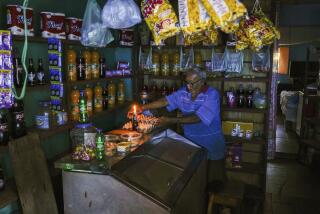Venezuela’s Chavez Says He’s Gaining Over Foes
- Share via
CARACAS, Venezuela — Venezuelan President Hugo Chavez said Sunday that he was “winning the war” against opposition strikers who have crippled the country’s vital oil industry for seven weeks.
The left-wing president, who has used troops to counter the strike -- an effort to force him to resign and hold early elections -- repeated a threat to withdraw from peace talks with opposition leaders that are being brokered by the Organization of American States. The talks have made little progress in more than two months.
The strike has slashed output in the world’s No. 5 petroleum exporter. It also has caused serious shortages of gasoline, cooking gas and some food items, sparking looting in some provincial towns and villages.
But Chavez, a former paratrooper who was elected in 1998 and survived a coup last year, said his government was making progress in restarting strike-bound oil fields and refineries.
Chavez named Gen. Lucas Rincon, a former defense minister and ex-armed forces chief, as interior and justice minister and Gen. Jorge Garcia Carneiro as the new chief of the army -- the most powerful branch of the armed forces.
Both generals are close allies of Chavez, who has used the armed forces to take over strike-hit oil installations, and, more recently, to raid food plants he accuses of deliberately hoarding goods to support the strike.
“Those who are trying to get rid of me by force, through a military coup or an economic coup, or by creating chaos, are not going to succeed,” Chavez said on Venezuelan television.
Since a short-lived coup against him last April, the president has purged his opponents from the military and now is doing the same in the strategic oil industry.
Some 2,000 striking oil executives and employees have been sacked.
In a move that drew howls of outrage from Chavez’s foes, National Guard troops Friday broke into two private beverage-manufacturing facilities.
One target was a local bottling affiliate of Coca-Cola Co. and the other a storage plant belonging to Venezuela’s biggest private company, Empresas Polar.
On Sunday, Chavez accused a U.S.-controlled technology company, Intesa, of joining what he called a campaign of sabotage by the opposition strikers against the state oil giant PDVSA.
Intesa, a subsidiary of San-Diego-based Science Applications International Corp., had been responsible for running PDVSA’s computer systems, which Chavez said were deliberately blocked and disrupted in the strike.
“The Intesa executives didn’t want to cooperate.... We’ll have to rescind that contract.... We’re nationalizing the brains of our oil industry,” the president said.
The strike against PDVSA has jolted world oil markets and cut off exports to the U.S., which normally imports over 13% of its oil from Venezuela.
Rejecting opposition reports that the strike-hit oil industry still was in the doldrums, Chavez predicted that output could reach 2 million barrels a day -- two-thirds of pre-strike levels -- by the end of January.
He put current production at close to 1.2 million barrels a day. Striking PDVSA executives say output is about half of that.
Chavez acknowledged that the gasoline situation still was “critical” and promised it would improve. Long lines formed outside gas stations across the country.
“We can’t dialogue with terrorists,” Chavez said, adding that his government was considering quitting the talks with opposition negotiators chaired by OAS Secretary General Cesar Gaviria.
The negotiations were to resume today.
More to Read
Sign up for Essential California
The most important California stories and recommendations in your inbox every morning.
You may occasionally receive promotional content from the Los Angeles Times.












